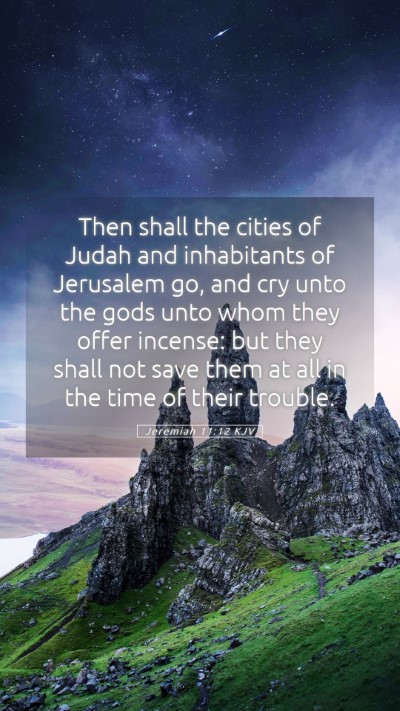Understanding Jeremiah 11:12
Jeremiah 11:12 states: "Then shall the cities of Judah and the inhabitants of Jerusalem go, and cry unto the gods unto whom they offer incense: but they shall not save them at all in the time of their trouble."
This verse illustrates a critical moment in the prophecy of Jeremiah, where God highlights the futility of idol worship and the impotence of false gods during times of distress.
Bible Verse Meanings
The essence of this prophecy is deeply rooted in the theme of divine judgment and the consequences of Israel's unfaithfulness. Through insights drawn from various public domain commentaries, we can explore the comprehensive meaning of this scripture:
-
Context of Apostasy:
Matthew Henry emphasizes that this verse reflects the spiritual decline of Judah, warning against the reliance on idols rather than the one true God. The people are depicted as turning to their false gods when troubles arise, only to find them lacking in power to save.
-
The Powerlessness of Idols:
Albert Barnes discusses how God challenges the notion that idols can provide any salvation. The overwhelming message is that in perilous times, God expects His people to call upon Him, not upon the idols crafted by human hands which ultimately offer no help.
-
Judgment and Warning:
Adam Clarke presents this as a stern warning from God. The context is prophetic, urging the people to recognize the consequences of their actions and to return to true faith. Clarke suggests that the straying from God is met with divine retribution, and idols cannot be relied upon in any real crisis.
Biblical Exegesis
This verse functions as part of a larger narrative concerning the covenant between God and the people of Judah. When they forsake God in favor of false deities, they invite disaster and separation from divine protection.
This is an ultimate call for repentance, where God’s warning implies that seeking help from worldly sources, especially during crises, is both misguided and fruitless.
Application of the Verse
For contemporary believers, Jeremiah 11:12 serves as a potent reminder of the importance of unwavering faith in God as opposed to reliance on material or spiritual counterfeits. It challenges individuals to reflect on their sources of strength and the genuine reliance on scripture for assistance in times of trouble.
Scripture Analysis: Key Themes
-
Idolatry:
The recurring biblical theme of idolatry is a focal point here. It reveals the contrast between true worship and the adoption of norms that are not conducive to spiritual health.
-
The Nature of Divine Help:
This verse illustrates the principle that true salvation comes from God alone. In any situation of need, calling upon Him should be our first response.
-
Consequences of Sin:
It illustrates the repercussions of spiritual disobedience. Turning away from God results in vulnerability during trials, highlighting a cycle of sin, judgment, and grace that permeates the narrative of the Old Testament.
Cross References
- Isaiah 44:9-20 - Discusses the futility of idol crafting.
- Psalms 135:15-18 - The impotence of man-made idols is reiterated.
- Jeremiah 2:28 - Highlights God's expectations of faithfulness versus idolatry.
- Hosea 13:4 - Reminders of God's sole sovereignty and the dangers of forgetting Him.
Conclusion
In summary, Jeremiah 11:12 serves as a timeless exhortation to trust wholeheartedly in the Lord amidst life's trials. By understanding this verse, believers can appreciate the depth of the call for faithfulness and the assurance that true salvation lies in a relationship with the Creator. This scripture invites deeper Bible study, invites individuals to engage in conversations about faith, and offers a framework for applying biblical truths in their daily lives.
Further Study
For groups and individuals interested in exploring this theme further, consider the following:
- Participating in Bible study groups focused on the Book of Jeremiah.
- Utilizing Bible study tools to delve deeper into prophetic literature.
- Engaging in online Bible study sessions to gain different perspectives on scripture interpretation.


